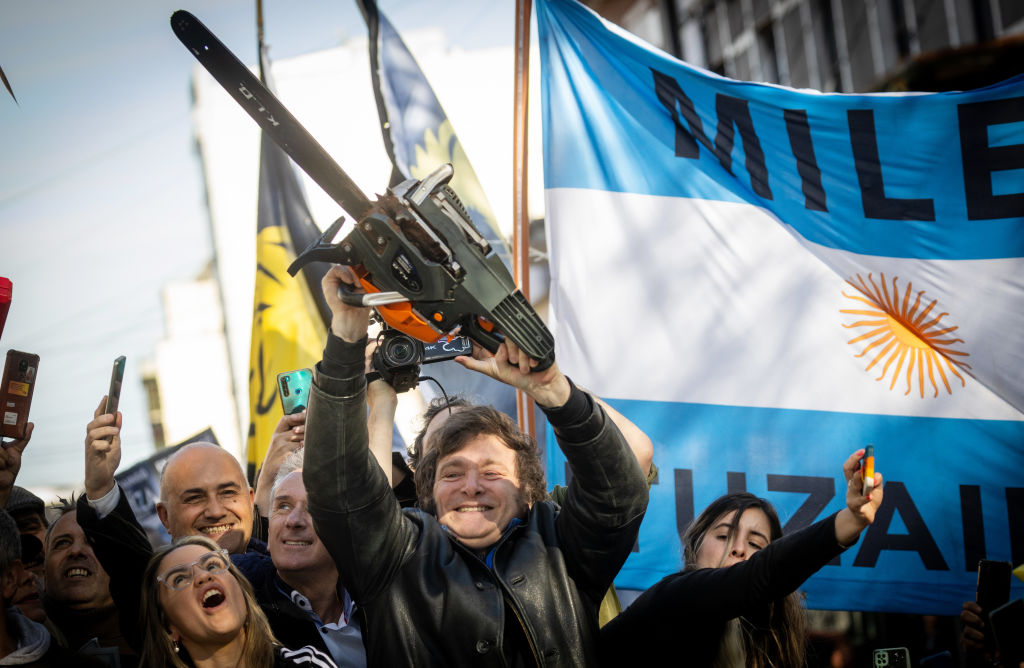Argentina Will Go to a Run Off After Left-Wing Candidate Makes a Surprisingly Strong Showing in First Round
Coming contest will be with the libertarian radical, Javier Milei, who had been expected to place first in the opening round.

Argentina’s presidential elections will go to a second round after the left-wing candidate, Sergio Massa — who is also the current minister of the economy — stunned the country by winning the first round of votes on Sunday amid the worst economic crisis in decades and one of the highest inflation rates in the world.
Mr. Massa received an unexpected 36.6 percent of the votes — almost a 10 percent increase from what his party had won during the primaries. The libertarian Javier Milei, whom polls predicted would comfortably win, received 29.9 percent of votes. In third place, right-wing Patricia Bullrich received 23.8 percent.
Messrs. Massa and Milei will now face each other in a second round of elections on November 19. On the one hand, the candidate for the traditional left-wing party, Mr. Massa, is seen as responsible for the country’s economic chaos but as a figure that could unite Argentines around one of the country’s strongest nationalistic movements, Perónism.

Mr. Massa spent most of the last weeks of his campaign emphasizing the consequences Mr. Milei’s triumph could bring to welfare programs and state-owned education and health care. Often compared to President Trump, Mr. Milei has attracted millions with his “chainsaw” initiative that promises to cut public spending. He also wants to shutter the central bank, overturn laws permitting abortion, and adopt the American greenback as the country’s currency.
A 27-year-old Argentinian from Zarate, Buenos Aires, Braian Lucero, tells the Sun that he votes for Mr. Milei as, unlike in respect of the other candidates, he sees a “profound change” in Mr. Milei’s proposals. A change in Argentina seems unlikely, to say the least, with the same politicians the country has had for decades, Mr. Lucero laments.
Celebrating his triumph with his followers in Complejo C at Chacarita, Mr. Massa said he is willing to work with different political parties and end the 40-year-old divide between Perónists and non-Perónists.
“As of December 10, we are going to open a new institutional stage in Argentine politics,” Mr. Massa told his followers after the results came out Sunday night. “I know that many of those who voted for us are the ones who are having the worst time. I will not fail you.”
In Mr. Milei’s venue at Hotel Libertador in Buenos Aires, meanwhile, the libertarian anarcho-capitalist anticipated a potential alliance with the right-wing party Together for Change. “All of us who want change must work together,” Mr. Milei said. He also emphasized how the presidential campaigns divided political parties that have always had the same goals and that he is willing to leave that antagonism in the past.
“Beyond our differences, we face a criminal organization that is going to commit atrocities in order to sustain itself. Kirchnerism is the worst,” Mr. Milei said.
In Ms. Bullrich’s venue, a sense of despair and disappointment dominated Parque Norte. “We have not achieved the goals we wanted for our Argentina, but we come to ratify with all the strength the values for our cause,” Ms. Bullrich told her followers Sunday night. Behind her stood a former president, Mauricio Macri, and the governor of the city of Buenos Aires, Horacio Rodriguez Larreta.
While it remains to be seen to whom Ms. Bullrich’s votes will go to in the runoffs, she is reiterating her stand against Mr. Massa. “We will never be accomplices of the mafias that destroyed this country,” Ms. Bullrich said. “I am not going to be the one to congratulate someone who was part of the worst government in Argentina,” Ms. Bullrich said.
Argentina’s inflation is hovering at about 138 percent annually. Poverty stands at about 40 percent. The peso has shed almost two-thirds of its value in the last 12 months. “You have no idea how much it hurts to live here,” Emiliano Rojas from Santa Cruz tells the Sun after the results were announced.
Mr. Rojas was a supporter of the left-wing party before. Now, he says Mr. Milei represents him best. “I can tell you today I will no longer give a vote for a social plan,” Mr. Rojas says. He adds he is tired of seeing the government steal from Argentinians. “Without corruption, we would be a world power,” Mr. Rojas says.
One of Mr. Milei’s signature campaign initiatives is ending what he calls Argentina’s “political caste.” He has often said the state is the enemy and politicians are “parasites” motivated only by their own greed.
During the weekend, Argentinians prepared for the post-election economy as they anticipated an impact on prices amid the elections. After the primaries in August, the peso devalued nearly 20 percent.
Many citizens used their pesos to buy home goods through the official marketplace in the country, Mercado Libre. On Friday, a cordless vacuum cleaner was valued at 113 thousand pesos. On Monday, 124 thousand. A toaster cost 25 thousand pesos before the weekend. After the elections, the price increased to 32 thousand.
Axel Kicillof, Mr. Massa’s candidate who sought reelection as governor of the province of Buenos Aires, won the election with 44.8 percent of the votes. For chief of government of the city of Buenos Aires, the Together for Change candidate, Jorge Macri, won with 49.6 percent of the votes.

